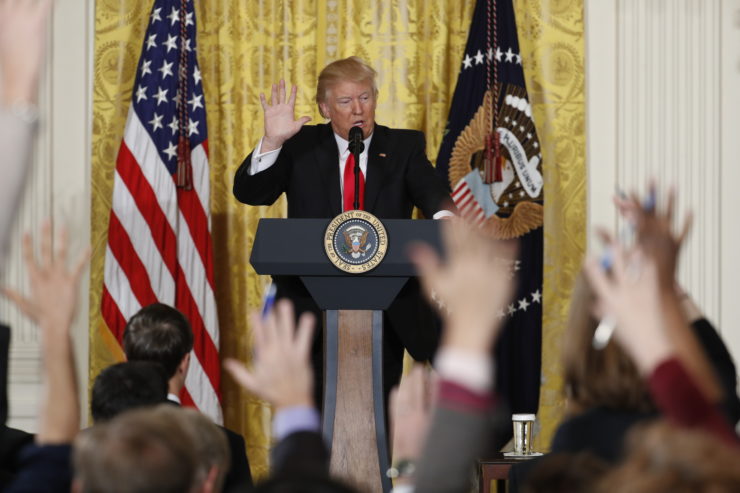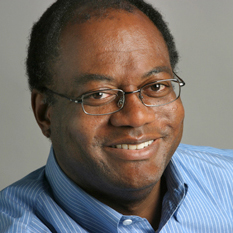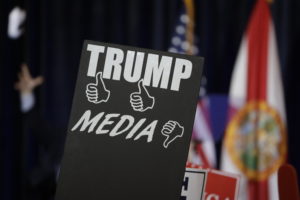
At his February 16 news conference, Trump said the press and the level of dishonesty within the media "is out of control"
In the late 1980s, I found myself banned from Indonesia. I ended up on the blacklist after a rookie correspondent’s mistake; I wrote that the longtime dictator, Suharto, had taken power in a coup, rather than using the military regime’s preferred version of history: that Suharto had stepped in and saved the country from an aborted Communist coup.
I got back into Indonesia thanks to help from an unlikely ally: the George H.W. Bush administration. The White House had dispatched Vice-president Dan Quayle on an overseas trip to Asia, and I was finally given an Indonesian visa and allowed to tag along on his plane.
The Bush White House, and particularly Quayle, did not have any particular love for the press or for my paper, The Washington Post. But they also understood that press freedom, and the ability of the media to report independently and adversarially, was essential to who we are as a democracy. It was one of the values American officials and diplomats wanted to impart when advocating for openness and human rights around the world.
This was true of both Democratic and Republican administrations. When The Washington Post had trouble getting visas for correspondents to be based in Communist China, in the mid-1990s and again starting in 2009, we could count on U.S. officials raising our visa problem in every official meeting with their Chinese counterparts.
So what will those same Chinese leaders think now when they see President Trump, in a tweet, describe the American press as “the enemy of the American people!” Or when they hear his chief of staff, Reince Priebus, say on television of Trump’s critique, “I think you should take it seriously … We’re talking about bogus stories.”
Will the Trump White House, and its top officials and diplomats, still protest when journalists around the world are jailed, when newspapers shut down, or when American correspondents are tossed out of countries on the grounds of trafficking in rumors? How can they, after insisting that America’s premier media outlets—the ones that set internationally recognized standards for accuracy and fairness—are merely trafficking in “fake news”?
Won’t every dictator and autocrat simply parrot back the Trump line, whenever a brave editor is sent to prison, that they were the “enemy” and publishing fake news? Or how about the next time an American correspondent is denied a visa and blacklisted the way I was in Indonesia? Since the U.S. president has already labeled the press as the enemy purveyors of “fake news,” it gives license now to every despot to treat American correspondents the way they do every other perceived enemy. The only difference now is they have the implied blessing of the Trump White House.
Treating the press as “the enemy” of the people, instead of a necessary adversary, has long been the default position of autocratic regimes I have covered, from Africa to East Asia.
Under founding leader Lee Kuan Yew, the favorite tactic of Singapore’s autocratic regime was to sue offending news media outlets for libel, and for large sums of money in damages. Targets included the New York Times, The Wall Street Journal and the Far Eastern Economic Review (FEER).
In Malaysia, Prime Minister Najib Razak has used the country’s harsh colonial-era sedition laws to jail journalists and to shutter news sites critical of his government and exposing corruption involving a state investment fund, called 1MDB.
The military junta running Thailand has imposed draconian restrictions on the press, banning any criticism of the coup, shutting down cable and satellite television stations and radio outlets deemed too politicized, and routinely blocking out foreign news broadcast outlets and online sites. Almost all discussion of politics has been curtailed, and some journalists were ordered to report to the military for “attitude adjustment” sessions.
Here in Hong Kong, the space for a free and independent press appears to be shrinking, as a result of the creeping ideological control of the local media by mainland China, hostility and harassment aimed at journalists, and the chilling effect of the abductions of five Hong Kong booksellers in 2015. The Hong Kong Journalists Association recently warned that the atmosphere for press freedom in the territory had reached an all-time low.
And what about China, where the foreign media has long felt under siege? What must they think hearing the American president echo their own belief, that, as Trump said, “The press is out of control, the level of dishonesty is out of control.”
Beijing’s rulers already seem to be soaking it all in with relish. Spreading rumors—fake news!—is already grounds in China for jailing bloggers and shutting down social media sites. Global Times, a Communist Party-owned nationalistic tabloid that often parrots the official line, ran a weekend editorial that could barely contain its glee. “Trump may be more persistent on some interests but less concerned about issues like human rights,” the paper intoned. “His war with mainstream media makes it difficult for Trump to ally with the media on ideological front against China.”
When President Obama or past American leaders traveled to authoritarian countries, they routinely insisted that the White House press corps be given access, and that there be a joint press conference at the end of the visit. Dictators may not like it—they often squirm when facing questions from assembled reporters—but they always knew that was the price of having the U.S. president visit.
Cuban President Raul Castro did not like it and was visibly rattled last year when he had to answer a question from an American reporter about human rights during a press conference with Obama at his side.
Chinese President Xi Jinping was notably angered when he had to take a question from an American reporter during Obama’s November 2014 visit to Beijing, and Xi was asked about China’s practice of denying visas to U.S. correspondents. At the time, reporters from The Times, Bloomberg and Al Jazeera were being denied visas. Xi accused the journalists of violating unspecified Chinese laws and said, “The party that has caused the problem should be the one to help resolve it.”
Xi will have a better answer ready next time—if Trump even bothers to insist on a joint press conference whenever the two leaders finally meet face to face.
“The level of dishonesty of the American press is out of control,” he can say. “Your failing newspapers only report fake news. Bogus stories! You are the enemies of the people!” And the assembled press might be forgiven for wondering whether the translator is reciting Xi’s words—or Trump’s.



